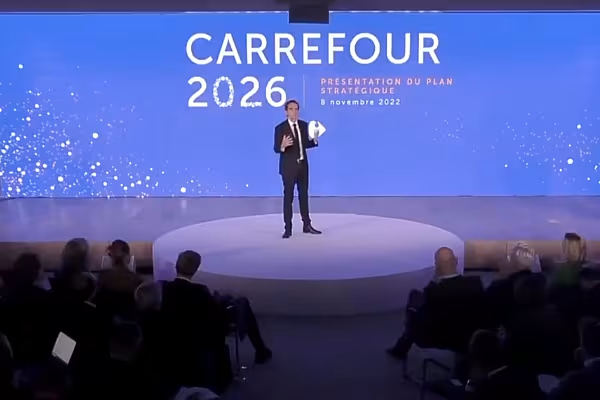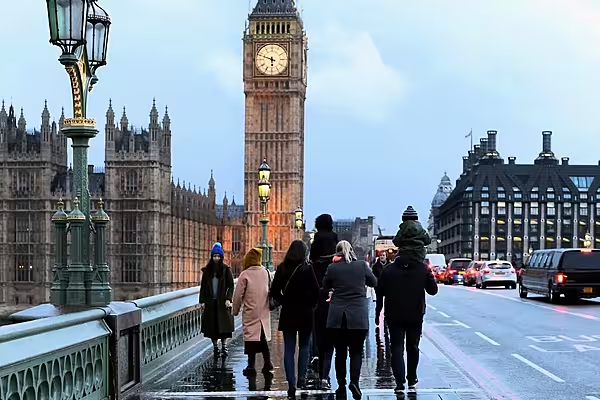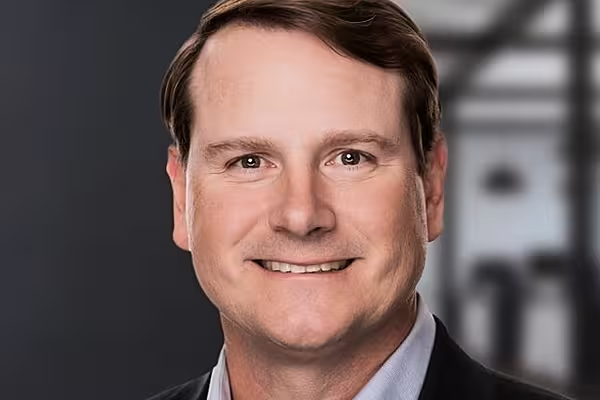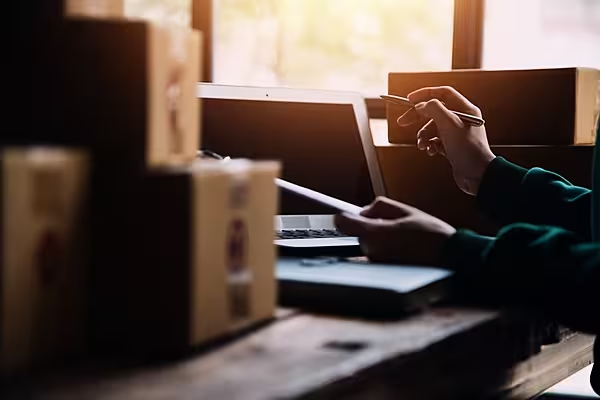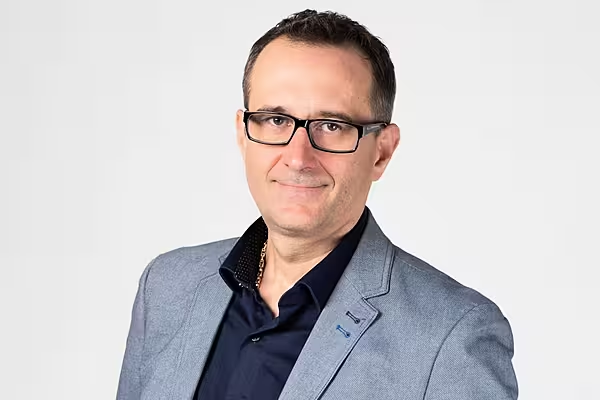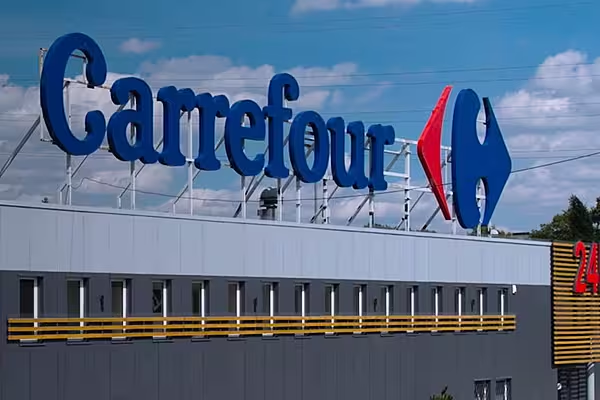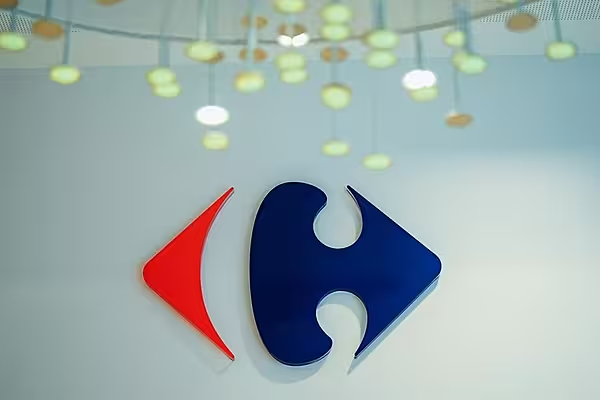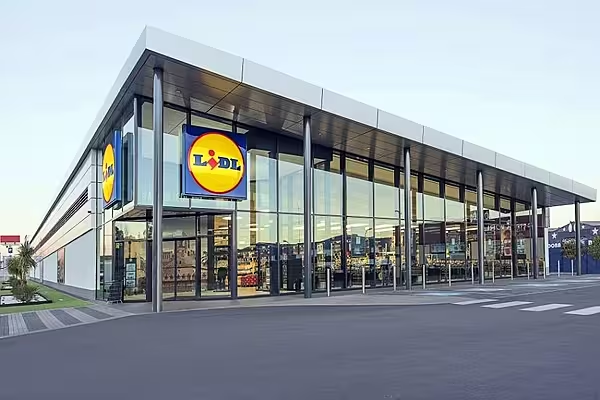Earlier this week, Carrefour chief executive Alexandre Bompard unveiled the group’s ‘Carrefour 2026’ strategic plan, through which the French retail giant will seek to navigate the current challenges and drive value creation over the next four years.
“With Carrefour 2026, we are accelerating our transformation by committing ourselves to giving all our customers access to the best, building a cutting-edge group, and consolidating our sustainable growth model,” Bompard commented at the launch of the strategy. “This is a very ambitious plan, whose deployment we will steer through granular, quantified, operational and financial objectives, as well as societal ones.”
En 2026, Carrefour sera plus fort, plus innovant. Ce sera une entreprise qui ne fait plus son âge.#Carrefour2026 pic.twitter.com/BXJxEvAIEq
— Alexandre Bompard (@bompard) November 8, 2022
Here are ten key talking points from the French retailer’s announcement.
1. Private-Label Investment Set To Ramp Up
Carrefour is aiming to have private label account for 40% of its sales by 2026 – up from the current 33% – which is bad news for brand owners that are themselves seeking to gain a stronger foothold in the European grocer’s outlets. The retailer will improve the visibility of its Simpl range and non-food brand Tex as part of its strategy to deliver ‘differentiation’ and ‘competitiveness’, and in response to the inflationary environment.
“We have proven that our products are just as good, while being less expensive,” Bompard said in his presentation. “We have created the cheapest brand on the market – Simpl – with a price index five points lower, on average, than hard-discounter prices. This is our anti-inflation response, and we will continue to expand it strongly in all our markets.
“We have expanded our ranges and now cover the full spectrum of our customers’ needs, in particular with Carrefour Bio, which represents more than 50% of our organic sales in France, and premium regional brands, such as Reflets de France and Terre d’Italia.”
2. A Greater Focus On Local Agriculture
Carrefour noted its plans to increase sales of its plant-based range in Europe – to €500 million by 2026 – and grow bulk sales by a multiple of five, in response to customers’ demands for more sustainable and healthy options.
The company added that it will increase purchasing from local suppliers in ‘ultra-short’ circuits (i.e. less than 50 kilometres from stores) in Europe, and, in France, it will launch the Potager City concept – a fresh-produce proximity format – of which three locations have already been sourced, in and around Paris.
Carrefour aims to reach €8 billion in turnover from sustainable products by 2026 with these initiatives, within its Act for Food programme.
“With 50,000 partner producers by 2026, we will be, more than ever, the leading partner in the agricultural world,” said Bompard.
3. Delivering Omnichannel Growth
Carrefour already boasts strong omnichannel sales. It noted that those who use its e-commerce services tend to spend 27% more two years after their first e-commerce purchase and have a higher retention rate (97%) than customers from stores alone. With this in mind, it is aiming to increase its omnichannel customer network to 30% of overall Carrefour customers by 2026, compared to 11% in 2021.
“Thanks to digital, we can make the multiplicity of our formats no longer a factor of complexity, but an asset, by creating a unique ecosystem to personalise the experience of our customers.” said Bompard. “To achieve this, we must activate all our personalisation and loyalty levers.”
4. Long Live The Hypermarket
Carrefour will maintain its focus on hypermarkets, due to their role as a discount format that can help consumers battle inflation, and the retailer will apply the ‘Maxi’ competitiveness and productivity method to its hypermarket estate. This has been already applied in Latin America, with each store adapted to its customers’ needs, according to each category area.
“Going back to basics means reducing our assortments. We will eliminate 40% of our permanent references in non-food, and 20% in food,” Bompard said.
5. Atacadão Comes To Europe
Carrefour plans to bring the Atacadão banner – a warehouse club format that has taken Brazil by storm in recent years – to France, with the opening of its first store under the banner in the Île-de-France region in autumn 2023. In Brazil, it also plans to grow its network of Atacadão outlets by 20 to 30 stores per year, aiming to reach 470 by 2026.
“Almost 50 years ago, in 1975, Carrefour opened the first hypermarket in Brazil, in São Paulo,” Bompard explained. “At the start of the 2023 school year, we will open the first Atacadão [in Europe], in Île-de-France.”
6. Expansion Of Successful Formats
Based on the success that it has achieved with the format since 2018, Carrefour noted that it is expanding its convenience store network, planning to open 2,400 stores by 2026, mainly through franchising.
Elsewhere, its Supeco soft-discount banner is also set for expansion, particularly in Spain, where the group aims to reach 200 stores by 2026 (+80 vs 2022).
7. Setting An E-Commerce Milestone
Carrefour noted that its objective is to reach €10 billion in e-commerce GMV by 2026, building on the plan presented at its Digital Day in 2021, as well as a €200 million increase in recurring operating income from its e-commerce activities.
To feed its omnichannel model, Carrefour has developed a digital strategy to diversify its service offering, such as in-store ‘buy now, pay later.’ It also plans to diversify its financial-services offering for both B2C and B2B.
8. Stepping Up Climate Change Targets
Carrefour has reiterated its commitment to reducing food waste by 50% by 2025, recovering 100% of its in-store waste, and having 100% of its own-brand product packaging reusable, recyclable or compostable by the same target date.
It is aiming to achieve carbon neutrality across its operations by 2040 – or by 2030 in its e-commerce business – and is upping its fight against deforestation with the creation of the Forest Committee, incorporating a €10 million fund to finance projects that contribute to the preservation of biodiversity.
Elsewhere, Carrefour will instal 4.5 million square metres of solar panels on its parking lots in France, Spain and Brazil, which will represent one terawatt-hour of theoretical electricity produced per year in 2027.
9. Simplifying The Business
Carrefour is seeking to develop a ‘simpler and more efficient organisation’ over the coming years, reducing staff numbers at its headquarters and mutualising support functions in other departments.
It plans to pool negotiations and purchasing, where possible, aiming to have 50% of its FMCG products, 30% of its fresh produce, and 70% of its non-food sourced through this approach. This will lead to around €4 billion in savings by 2026, the group noted.
“All of our major international suppliers will go through our single European purchasing centre, Eureca,” said Bompard. “Our non-food offer will also be centralised and European.”
10. Trust In The Franchisee Model
Carrefour reiterated its focus on franchise and lease management models, adding that 90% of the future store openings in Europe will be under a franchise model. In addition, it will continue to transfer stores to franchise and lease management operators in Europe.
Its investment in franchising will also lead to greater territorial expansion, it added. The retailer plans to open in ten new markets by 2026 – in Africa, the Middle East and Latin America – while accelerating the export of Carrefour-branded products.
© 2022 European Supermarket Magazine – your source for the latest retail news. Article by Amanda Merchán and Stephen Wynne-Jones. Click subscribe to sign up to ESM: European Supermarket Magazine.
